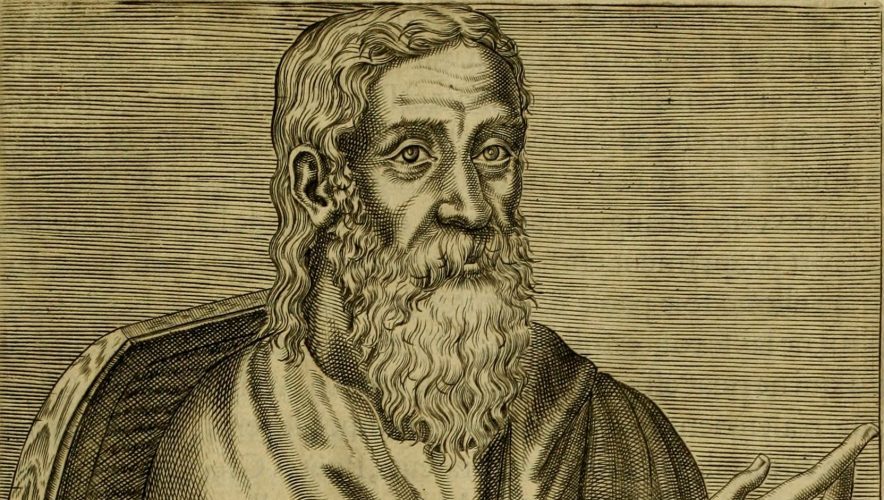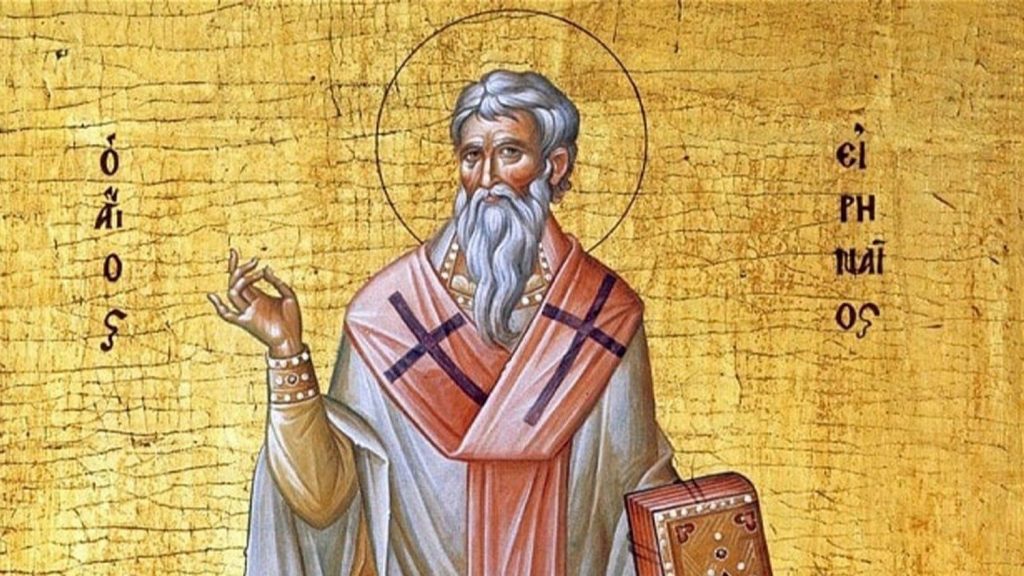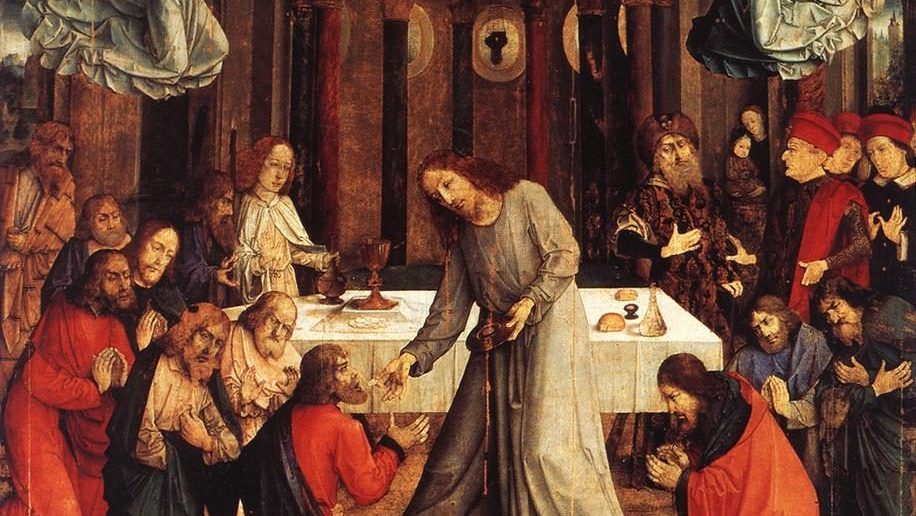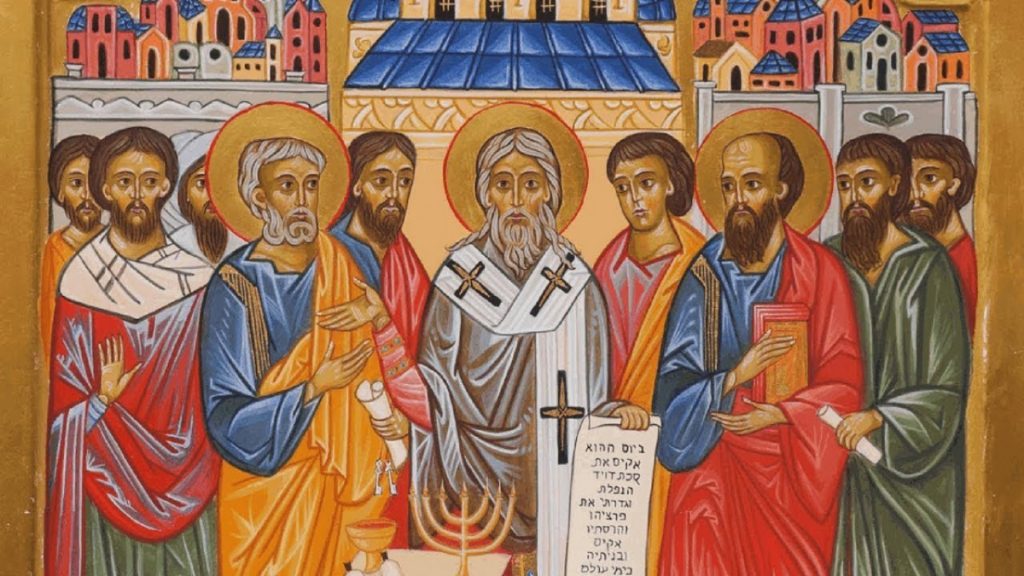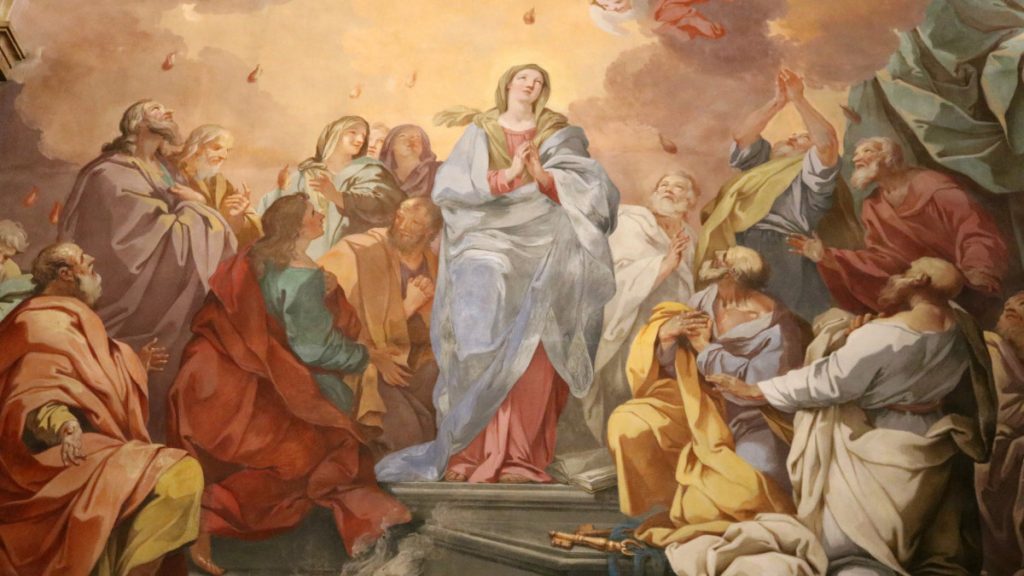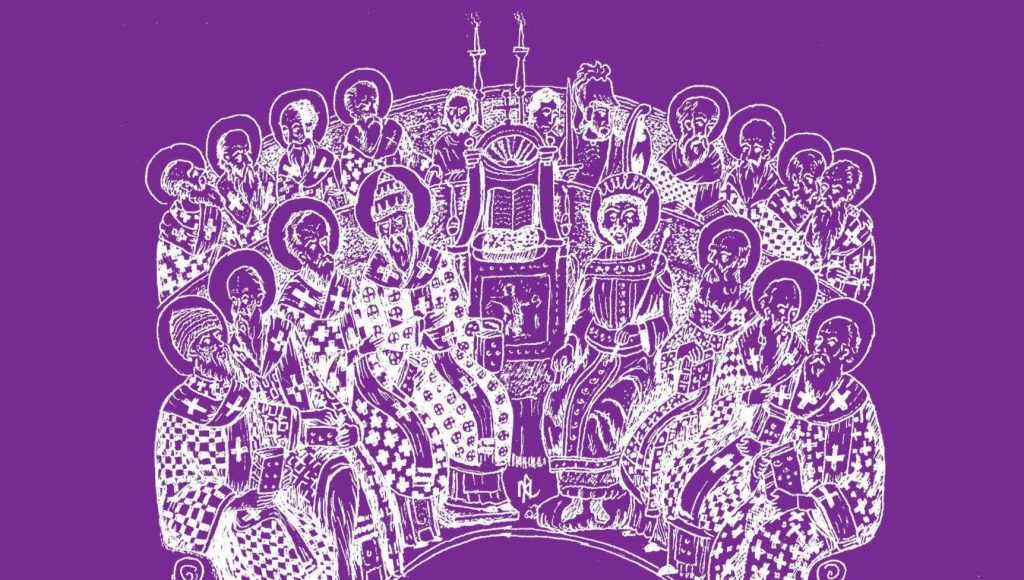(Updated July 17, 2025)
This Author Quote Archive collects pertinent quotes from the Church Father, St. Clement of Alexandria.
Next to each quote are the Topic Quote Archives in which they are included.
This Quote Archive is being continuously updated as research continues. Quotes marked with “***” have not yet been organized into their respective Topic Quote Archives.
Books
St. Clement of Alexandria, Christ the Educator (191)
Parts of this work contained in the CCEL have not been translated from the original Latin. In those cases, we consulted the CUA text.
- Abortion | Book 2, Ch. 10, §96
- Homosexual and Gender-Confusing Behavior | Book 2, Ch. 6
- Patriarchy, Feminism, and the Roles of Men and Women | Book 2, Ch. 13 | Book 3, Ch. 11
- The Sacrament of Baptism | Book 1, Ch. 6, 12
- The Blessed Sacrament of the Holy Eucharist | Book 1, Ch. 6
- The Sacrament of Holy Orders, and the Authority of the Priesthood | Book 3, Ch. 11, 12
- The Sacrament of Marriage, Divorce, and Contraception | Book 2, Ch. 10, §§91-93, 95
(Book 1, Ch. 6, 12)
(Ch. 6) …Being baptized, we are illuminated; illuminated, we become sons; being made sons, we are made perfect; being made perfect, we are made immortal. “I,” says He, “have said that you are gods, and all sons of the Highest” (Ps. 82:6). This work is variously called grace, and illumination, and perfection, and washing: washing, by which we cleanse away our sins; grace, by which the penalties accruing to transgressions are remitted; and illumination, by which that holy light of salvation is beheld, that is, by which we see God clearly…[T]hus also we who are baptized, having wiped off the sins which obscure the light of the Divine Spirit, have the eye of the spirit free, unimpeded, and full of light, by which alone we contemplate the Divine, the Holy Spirit flowing down to us from above. This is the eternal adjustment of the vision, which is able to see the eternal light, since like loves like; and that which is holy, loves that from which holiness proceeds, which has appropriately been termed light…For what ignorance has bound ill, is by knowledge loosed well; those bonds are with all speed slackened by human faith and divine grace, our transgressions being taken away by one Paeones medicine, the baptism of the Word. We are washed from all our sins, and are no longer entangled in evil. This is the one grace of illumination, that our characters are not the same as before our washing. And since knowledge springs up with illumination, shedding its beams around the mind, the moment we hear, we who were untaught become disciples. Does this, I ask, take place on the advent of this instruction? You cannot tell the time. For instruction leads to faith, and faith with baptism is trained by the Holy Spirit…In the same way, therefore, we also, repenting of our sins, renouncing our iniquities, purified by baptism, speed back to the eternal light, children to the Father…
“Eat my flesh,” He says, “and drink my blood” (John 6:53-54). Such is the suitable food which the Lord ministers, and He offers His flesh and pours forth His blood, and nothing is wanting for the children’s growth. O amazing mystery! We are enjoined to cast off the old and carnal corruption, as also the old nutriment, receiving in exchange another new regimen, that of Christ, receiving Him if we can, to hide Him within; and that, enshrining the Savior in our souls, we may correct the affections of our flesh…
(Ch. 12) …He Himself formed man of the dust, and regenerated him by water; and made him grow by his Spirit; and trained him by His word to adoption and salvation, directing him by sacred precepts; in order that, transforming earth-born man into a holy and heavenly being by His advent, He might fulfill to the utmost that divine utterance, Let Us make man in Our own image and likeness [Gen. 1:26]. And, in truth, Christ became the perfect realization of what God spoke; and the rest of humanity is conceived as being created merely in His image…
In accordance with these remarks, conversation about deeds of wickedness is appropriately termed filthy [shameful] speaking, as talk about adultery and pederasty and the like.
(Book 2, Ch. 10, §§91-93, 95-96)1
(§91) …This [marital relations] is to share in God’s own work of creation, and in such a work the seed ought not be wasted nor scattered thoughtlessly nor sown in a way it cannot grow. (§92) As an illustration of this last restriction, the same Moses forbade the Jews to approach even their own wives if they happened to be in the period of menstruation [Lev. 15:19]. The reason is that it is wrong to contaminate fertile seed, destined to become a human being, with corrupt matter of the body, or to allow it be diverted from the furrow of the womb and swept away in a fetid flow of matter and excrement.
He [Moses] discouraged the ancient Jews, also, from having relations with a wife already with child. Pleasure sought for its own sake, even within the marriage bonds, is a sin and contrary both to law and to reason… 170 | 171 (§93) It is wrong, indeed, to interfere with the workings of nature by indulging in the extravagances of wantonness… 171 | 173
(§95) …Yet, marriage in itself merits esteem and the highest approval, for the Lord wished men to “be fruitful and multiply” (Gen. 1:28). He did not tell them, however, to act like liberties, nor did He intend them to surrender themselves to pleasure as though born only to indulge in sexual relations. Let the Educator [Christ] put us to shame with the word of Ezekiel: “Put away your fornications” (Ezek. 43:9). Why, even unreasoning beasts know enough not to mate at certain times. To indulge in intercourse without intending children is to outrage nature, whom we should take as our instructor. Her wise directions concerning the periods of life are meant to be obeyed; I mean that she allows us to marry at any time but after the advent of old age and during childhood (for she does not permit the one to marry yet, the other, any more). The attempt to procreate children is marriage, but the promiscuous scattering of seed contrary to law and to reason definitely is not.
(§96) If we should but control our lusts at the start and if we would not kill off the human race born and developing according 173 | 174 to the divine plan, then our whole lives would be lived according to nature. But women who resort to some sort of deadly abortion drug kill not only the embryo but, along with it, all human kindness.
And let not their ears be pierced, contrary to nature, in order to attach to them ear-rings and ear-drops. For it is not right to force nature against her wishes. Nor could there be any better ornament for the ears than true instruction, which finds its way naturally into the passages of hearing. And eyes anointed by the Word, and ears pierced for perception, make a man a hearer and contemplator of divine and sacred things, the Word truly exhibiting the true beauty “which eye hath not seen nor ear heard before” (1 Cor. 2:9).
(Book 3, Ch. 11, 12)
(Ch. 11) …The Word prohibits us from doing violence to nature by boring the lobes of the ears. For why not the nose too?—so that, what was spoken, may be fulfilled: “As an ear-ring in a swine’s nose, so is beauty to a woman without discretion” (Prov. 11:22). For, in a word, if one thinks himself made beautiful by gold, he is inferior to gold; and he that is inferior to gold is not lord of it. But to confess one’s self less ornamental than the Lydian ore, how monstrous! As, then, the gold is polluted by the dirtiness of the sow, which stirs up the mire with her snout, so those women that are luxurious to excess in their wantonness, elated by wealth, dishonor by the stains of amatory indulgences what is the true beauty…But additions of other people’s hair are entirely to be rejected, and it is a most sacrilegious thing for spurious hair to shade the head, covering the skull with dead locks. For on whom does the presbyter lay his hand? Whom does he bless?…
(Ch. 12) …Innumerable commands such as these are written in the holy Bible appertaining to chosen persons, some to presbyters, some to bishops, some to deacons, others to widows, of whom we shall have another opportunity of speaking. Many things spoken in enigmas, many in parables, may benefit such as fall in with them. But it is not my province, says the Instructor, to teach these any longer. But we need a Teacher of the exposition of those sacred words, to whom we must direct our steps…
St. Clement of Alexandria, The Stromata, or Miscellanies (c. 207)
- Apostolic Tradition | Book 1, Ch. 1
- The Papacy and the Invincibility of the Church | Book 6, Ch. 15
- Purgatory | Book 6, Ch. 14
- The Communion of Saints: Intercession and Relics | Book 7, Ch. 12
- Development of Doctrine | Book 7, Ch. 15
- The Sacrament of Baptism | Book 4, Ch. 24
- The Sacrament of Holy Orders, and the Authority of the Priesthood | Book 6, Ch. 13
- The Sacrament of Marriage, Divorce, and Contraception | Book 2, Ch. 23
- The Heretical and Schismatic Spirit | Book 7, Ch. 15–16
Well, they preserving the tradition of the blessed doctrine derived directly from the holy apostles, Peter, James, John, and Paul, the sons receiving it from the father (but few were like the fathers), came by God’s will to us also to deposit those ancestral and apostolic seeds. And well I know that they will exult; I do not mean delighted with this tribute, but solely on account of the preservation of the truth, according as they delivered it. For such a sketch as this, will, I think, be agreeable to a soul desirous of preserving from escape the blessed tradition…
(Book 1, Ch. 5) ***
Accordingly, before the advent of the Lord, philosophy was necessary to the Greeks for righteousness. And now it becomes conducive to piety; being a kind of preparatory training to those who attain to faith through demonstration. “For thy foot,” it is said, “will not stumble, if thou refer what is good, whether belonging to the Greeks or to us, to Providence.” For God is the cause of all good things; but of some primarily, as of the Old and the New Testament; and of others by consequence, as philosophy. Perchance, too, philosophy was given to the Greeks directly and primarily, till the Lord should call the Greeks. For this was a schoolmaster to bring “the Hellenic mind,” as the law, the Hebrews, “to Christ.” Philosophy, therefore, was a preparation, paving the way for him who is perfected in Christ.
(Book 1, Ch. 16) ***
But if the Hellenic (Greek) philosophy comprehends not the whole extent of the truth, and besides is destitute of strength to perform the commandments of the Lord, yet it prepares the way for the truly royal teaching; training in some way or other, and molding the character, and fitting him who believes in Providence for the reception of the truth.
Since pleasure and lust seem to fall under marriage, it must also be treated of. Marriage is the first conjunction of man and woman for the procreation of legitimate children…
Now that the Scripture counsels marriage, and allows no release from the union, is expressly contained in the law, “You shall not put away thy wife, except for the cause of fornication”; and it regards as fornication, the marriage of those separated while the other is alive. Not to deck and adorn herself beyond what is becoming, renders a wife free of calumnious suspicion, while she devotes herself assiduously to prayers and supplications; avoiding frequent departures from the house, and shutting herself up as far as possible from the view of all not related to her, and deeming housekeeping of more consequence than impertinent trifling. “He that takes a woman that has been put away,” it is said, “commits adultery; and if one puts away his wife, he makes her an adulteress” (Matt. 5:32; 19:9); that is, compels her to commit adultery. And not only is he who puts her away guilty of this, but he who takes her, by giving to the woman the opportunity of sinning; for did he not take her, she would return to her husband.
It ought to be known, then, that those who fall into sin after baptism are those who are subjected to discipline; for the deeds done before are remitted [by baptism], and those done after are purged [by penance]…
Those, then, also now, who have exercised themselves in the Lord’s commandments, and lived perfectly and gnostically [knowledgeably] according to the Gospel, may be enrolled in the chosen body of the apostles. Such an one is in reality a presbyter of the Church, and a true minister (deacon) of the will of God, if he do and teach what is the Lord’s; not as being ordained by men, nor regarded righteous because a presbyter, but enrolled in the presbyterate because righteous. And although here upon earth he be not honored with the chief seat, he will sit down on the four-and-twenty thrones, judging the people, as John says in the Apocalypse.
For, in truth, the covenant of salvation, reaching down to us from the foundation of the world, through different generations and times, is one, though conceived as different in respect of gift. For it follows that there is one unchangeable gift of salvation given by one God, through one Lord, benefiting in many ways. For which cause the middle wall which separated the Greek from the Jew is taken away, in order that there might be a peculiar people. And so both meet in the one unity of faith; and the selection out of both is one. And the chosen of the chosen are those who by reason of perfect knowledge are called [as the best] from the Church itself, and honored with the most august glory—the judges and rulers—four-and-twenty (the grace being doubled) equally from Jews and Greeks. Since, according to my opinion, the grades here in the Church, of bishops, presbyters, deacons, are imitations of the angelic glory, and of that economy which, the Scriptures say, awaits those who, following the footsteps of the apostles, have lived in perfection of righteousness according to the Gospel. For these taken up in the clouds, the apostle [1 Thess. 4:17] writes, will first minister [as deacons], then be classed in the presbyterate, by promotion in glory (for glory differs from glory [1 Cor. 15:41]) till they grow into a perfect man [Eph. 4:13].
Now to know is more than to believe, as to be dignified with the highest honor after being saved is a greater thing than being saved. Accordingly the believer, through great discipline, divesting himself of the passions, passes to the mansion which is better than the former one, viz., to the greatest torment, taking with him the characteristic of repentance from the sins he has committed after baptism. He is tortured then still more—not yet or not quite attaining what he sees others to have acquired. Besides, he is also ashamed of his transgressions. The greatest torments, indeed, are assigned to the believer. For God’s righteousness is good, and His goodness is righteous. And though the punishments cease in the course of the completion of the expiation and purification of each one, yet those have very great and permanent grief who are found worthy of the other fold, on account of not being along with those that have been glorified through righteousness.
The liars, then, in reality are not those who for the sake of the scheme of salvation conform, nor those who err in minute points, but those who are wrong in essentials, and reject the Lord, and as far as in them lies deprive the Lord of the true teaching; who do not quote or deliver the Scriptures in a manner worthy of God and of the Lord; for the deposit rendered to God, according to the teaching of the Lord by His apostles, is the understanding and the practice of the godly tradition…“But all things are right,” says the Scripture, “before those who understand” (Prov. 8:9), that is, those who receive and observe, according to the ecclesiastical rule, the exposition of the Scriptures explained by Him; and the ecclesiastical rule is the concord and harmony of the law and the prophets in the covenant delivered at the coming of the Lord. Knowledge is then followed by practical wisdom, and practical wisdom by self-control: for it may be said that practical wisdom is divine knowledge, and exists in those who are deified; but that self-control is mortal, and subsists in those who philosophize, and are not yet wise.
So is he [the Christian] always pure for prayer. He also prays in the society of angels, as being already of angelic rank, and he is never out of their holy keeping; and though he pray alone, he has the choir of the saints standing with him…
(Book 7, Ch. 13) ***
They say in the traditions that Matthew the apostle constantly said, that “if the neighbor of an elect man sin, the elect man has sinned. For had he conducted himself as the Word prescribes, his neighbor also would have been filled with such reverence for the life he led as not to sin.”
(Book 7, Ch. 14) ***
“Wherefore,” he says, “you are justified in the name of the Lord.” You are made, so to speak, by Him to be righteous as He is, and are blended as far as possible with the Holy Spirit.
(Book 7, Ch. 15-16)
(Ch. 15) Since it comes next to reply to the objections alleged against us by Greeks and Jews; and since, in some of the questions previously discussed, the sects also who adhere to other teaching give their help, it will be well first to clear away the obstacles before us, and then, prepared thus for the solution of the difficulties, to advance to the succeeding Miscellany.
First, then, they make this objection to us, saying, that they ought not to believe on account of the discord of the sects. For the truth is warped when some teach one set of dogmas, others another.
To whom we say, that among you who are Jews, and among the most famous of the philosophers among the Greeks, very many sects have sprung up. And yet you do not say that one ought to hesitate to philosophize or Judaize, because of the want of agreement of the sects among you between themselves. And then, that heresies should be sown among the truth, as “tares among the wheat,” was foretold by the Lord; and what was predicted to take place could not but happen [Matt. 13:28]. And the cause of this is, that everything that is fair is followed by a foul blot. If one, then, violate his engagements, and go aside from the confession which he makes before us, are we not to stick to the truth because he has belied his profession? But as the good man must not prove false or fail to ratify what he has promised, although others violate their engagements; so also are we bound in no way to transgress the canon of the Church. And especially do we keep our profession in the most important points, while they traverse it.
Those, then, are to be believed, who hold firmly to the truth. And we may broadly make use of this reply, and say to them, that physicians holding opposite opinions according to their own schools, yet equally in point of fact treat patients. Does one, then, who is ill in body and needing treatment, not have recourse to a physician, on account of the different schools in medicine? No more, then, may he who in soul is sick and full of idols, make a pretext of the heresies, in reference to the recovery of health and conversion to God.
Further, it is said that it is on account of “those that are approved that heresies exist” (1 Cor. 11:19). [The apostle] calls “approved,” either those who in reaching faith apply to the teaching of the Lord with some discrimination (as those are called skillful money-changers, who distinguish the spurious coin from the genuine by the false stamp), or those who have already become approved both in life and knowledge.
For this reason, then, we require greater attention and consideration in order to investigate how precisely we ought to live, and what is the true piety. For it is plain that, from the very reason that truth is difficult and arduous of attainment, questions arise from which spring the heresies, savoring of self-love and vanity, of those who have not learned or apprehended truly, but only caught up a mere conceit of knowledge. With the greater care, therefore, are we to examine the real truth, which alone has for its object the true God. And the toil is followed by sweet discovery and reminiscence.
On account of the heresies, therefore, the toil of discovery must be undertaken; but we must not at all abandon [the truth]. For, on fruit being set before us, some real and ripe, and some made of wax, as like the real as possible, we are not to abstain from both on account of the resemblance. But by the exercise of the apprehension of contemplation, and by reasoning of the most decisive character, we must distinguish the true from the seeming.
And as, while there is one royal highway, there are many others, some leading to a precipice, some to a rushing river or to a deep sea, no one will shrink from traveling by reason of the diversity, but will make use of the safe, and royal, and frequented way; so, though some say this, some that, concerning the truth, we must not abandon it; but must seek out the most accurate knowledge respecting it. Since also among garden-grown vegetables weeds also spring up, are the husbandmen, then, to desist from gardening?
Having then from nature abundant means for examining the statements made, we ought to discover the sequence of the truth. Wherefore also we are rightly condemned, if we do not assent to what we ought to obey, and do not distinguish what is hostile, and unseemly, and unnatural, and false, from what is true, consistent, and seemly, and according to nature. And these means must be employed in order to attain to the knowledge of the real truth.
This pretext is then, in the case of the Greeks, futile; for those who are willing may find the truth. But in the case of those who adduce unreasonable excuses, their condemnation is unanswerable. For whether do they deny or admit that there is such a thing as demonstration? I am of opinion that all will make the admission, except those who take away the senses. There being demonstration, then, it is necessary to condescend to questions, and to ascertain by way of demonstration by the Scriptures themselves how the heresies failed, and how in the truth alone and in the ancient Church is both the exactest knowledge, and the truly best set of principles (αἴρεσις).
Now, of those who diverge from the truth, some attempt to deceive themselves alone, and some also their neighbors. Those, then, who are called (δοξόσοφοι) wise in their own opinions, who think that they have found the truth, but have no true demonstration, deceive themselves in thinking that they have reached a resting place. And of whom there is no inconsiderable multitude, who avoid investigations for fear of refutations, and shun instructions for fear of condemnation. But those who deceive those who seek access to them are very astute; who, aware that they know nothing, yet darken the truth with plausible arguments.
But, in my opinion, the nature of plausible arguments is of one character, and that of true arguments of another. And we know that it is necessary that the appellation of the heresies should be expressed in contradistinction to the truth; from which the Sophists, drawing certain things for the destruction of men, and burying them in human arts invented by themselves, glory rather in being at the head of a School than presiding over the Church.
(Ch. 16) But those who are ready to toil in the most excellent pursuits, will not desist from the search after truth, till they get the demonstration from the Scriptures themselves.
There are certain criteria common to men, as the senses; and others that belong to those who have employed their wills and energies in what is true—the methods which are pursued by the mind and reason, to distinguish between true and false propositions.
Now, it is a very great thing to abandon opinion, by taking one’s stand between accurate knowledge and the rash wisdom of opinion, and to know that he who hopes for everlasting rest knows also that the entrance to it is toilsome “and strait.” And let him who has once received the Gospel, even in the very hour in which he has come to the knowledge of salvation, “not turn back, like Lot’s wife” [Gen. 19:26], as is said; and let him not go back either to his former life, which adheres to the things of sense, or to heresies. For they form the character, not knowing the true God. “For he that loves father or mother more than Me,” the Father and Teacher of the truth, who regenerates and creates anew, and nourishes the elect soul, “is not worthy of Me”—He means, to be a son of God and a disciple of God, and at the same time also to be a friend, and of kindred nature. “For no man who looks back, and puts his hand to the plough, is fit for the kingdom of God” (Luke 9:62).
But, as appears, many even down to our own time regard Mary, on account of the birth of her child, as having been in the puerperal state, although she was not. For some say that, after she brought forth, she was found, when examined, to be a virgin.
Now such to us are the Scriptures of the Lord, which gave birth to the truth and continue virgin, in the concealment of the mysteries of the truth. “And she brought forth, and yet brought not forth” [drawn from Ezek. 44:2], says the Scripture; as having conceived of herself, and not from conjunction. Wherefore the Scriptures have conceived to Gnostics; but the heresies, not having learned them, dismissed them as not having conceived.
Now all men, having the same judgment, some, following the Word speaking, frame for themselves proofs; while others, giving themselves up to pleasures, wrest Scripture, in accordance with their lusts [2 Pet. 3:16]. And the lover of truth, as I think, needs force of soul. For those who make the greatest attempts must fail in things of the highest importance; unless, receiving from the truth itself the rule of the truth, they cleave to the truth. But such people, in consequence of falling away from the right path, err in most individual points; as you might expect from not having the faculty for judging of what is true and false, strictly trained to select what is essential. For if they had, they would have obeyed the Scriptures.
As, then, if a man should, similarly to those drugged by Circe, become a beast; so he, who has spurned the ecclesiastical tradition, and darted off to the opinions of heretical men, has ceased to be a man of God and to remain faithful to the Lord. But he who has returned from this deception, on hearing the Scriptures, and turned his life to the truth, is, as it were, from being a man made a god.
For we have, as the source of teaching, the Lord, both by the prophets, the Gospel, and the blessed apostles, “in diverse manners and at sundry times” (Heb. 1:1), leading from the beginning of knowledge to the end. But if one should suppose that another origin was required, then no longer truly could an origin be preserved.
He, then, who of himself believes the Scripture and voice of the Lord, which by the Lord acts to the benefiting of men, is rightly [regarded] faithful. Certainly we use it as a criterion in the discovery of things. What is subjected to criticism is not believed till it is so subjected; so that what needs criticism cannot be a first principle. Therefore, as is reasonable, grasping by faith the indemonstrable first principle, and receiving in abundance, from the first principle itself, demonstrations in reference to the first principle, we are by the voice of the Lord trained up to the knowledge of the truth.
For we may not give our adhesion to men on a bare statement by them, who might equally state the opposite. But if it is not enough merely to state the opinion, but if what is stated must be confirmed, we do not wait for the testimony of men, but we establish the matter that is in question by the voice of the Lord, which is the surest of all demonstrations, or rather is the only demonstration; in which knowledge those who have merely tasted the Scriptures are believers; while those who, having advanced further, and become correct expounders of the truth, are Gnostics. Since also, in what pertains to life, craftsmen are superior to ordinary people, and model what is beyond common notions; so, consequently, we also, giving a complete exhibition of the Scriptures from the Scriptures themselves, from faith persuade by demonstration.
And if those also who follow heresies venture to avail themselves of the prophetic Scriptures; in the first place they will not make use of all the Scriptures, and then they will not quote them entire, nor as the body and texture of prophecy prescribe. But, selecting ambiguous expressions, they wrest them to their own opinions, gathering a few expressions here and there; not looking to the sense, but making use of the mere words. For in almost all the quotations they make, you will find that they attend to the names alone, while they alter the meanings; neither knowing, as they affirm, nor using the quotations they adduce, according to their true nature.
But the truth is not found by changing the meanings (for so people subvert all true teaching), but in the consideration of what perfectly belongs to and becomes the Sovereign God, and in establishing each one of the points demonstrated in the Scriptures again from similar Scriptures. Neither, then, do they want to turn to the truth, being ashamed to abandon the claims of self-love; nor are they able to manage their opinions, by doing violence to the Scriptures. But having first promulgated false dogmas to men; plainly fighting against almost the whole Scriptures, and constantly confuted by us who contradict them; for the rest, even now partly they hold out against admitting the prophetic Scriptures, and partly disparage us as of a different nature, and incapable of understanding what is peculiar to them. And sometimes even they deny their own dogmas, when these are confuted, being ashamed openly to own what in private they glory in teaching. For this may be seen in all the heresies, when you examine the iniquities of their dogmas. For when they are overturned by our clearly showing that they are opposed to the Scriptures, one of two things may be seen to have been done by those who defend the dogma. For they either despise the consistency of their own dogmas, or despise the prophecy itself, or rather their own hope. And they invariably prefer what seems to them to be more evident to what has been spoken by the Lord through the prophets and by the Gospel, and, besides, attested and confirmed by the apostles.
Seeing, therefore, the danger that they are in (not in respect of one dogma, but in reference to the maintenance of the heresies) of not discovering the truth; for while reading the books we have ready at hand, they despise them as useless, but in their eagerness to surpass common faith, they have diverged from the truth. For, in consequence of not learning the mysteries of ecclesiastical knowledge, and not having capacity for the grandeur of the truth, too indolent to descend to the bottom of things, reading superficially, they have dismissed the Scriptures. Elated, then, by vain opinion, they are incessantly wrangling, and plainly care more to seem than to be philosophers. Not laying as foundations the necessary first principles of things; and influenced by human opinions, then making the end to suit them, by compulsion; on account of being confuted, they spar with those who are engaged in the prosecution of the true philosophy, and undergo everything, and, as they say, ply every oar, even going the length of impiety, by disbelieving the Scriptures, rather than be removed from the honors of the heresy and the boasted first seat in their churches; on account of which also they eagerly embrace that convivial couch of honor in the Agape [love feast], falsely so called.
The knowledge of the truth among us from what is already believed, produces faith in what is not yet believed; which [faith] is, so to speak, the essence of demonstration. But, as appears, no heresy has at all ears to hear what is useful, but opened only to what leads to pleasure. Since also, if one of them would only obey the truth, he would be healed.
Now the cure of self-conceit (as of every ailment) is threefold: the ascertaining of the cause, and the mode of its removal; and thirdly, the training of the soul, and the accustoming it to assume a right attitude to the judgments come to. For, just like a disordered eye, so also the soul that has been darkened by unnatural dogmas cannot perceive distinctly the light of truth, but even overlooks what is before it.
They say, then, that in muddy water eels are caught by being blinded. And just as knavish boys bar out the teacher, so do these shut out the prophecies from their Church, regarding them with suspicion by reason of rebuke and admonition. In fact, they stitch together a multitude of lies and figments, that they may appear acting in accordance with reason in not admitting the Scriptures. So, then, they are not pious, inasmuch as they are not pleased with the divine commands, that is, with the Holy Spirit. And as those almonds are called empty in which the contents are worthless, not those in which there is nothing; so also we call those heretics empty, who are destitute of the counsels of God and the traditions of Christ; bitter, in truth, like the wild almond, their dogmas originating with themselves, with the exception of such truths as they could not, by reason of their evidence, discard and conceal.
As, then, in war the soldier must not leave the post which the commander has assigned him, so neither must we desert the post assigned by the Word, whom we have received as the guide of knowledge and of life. But [most] have not even inquired, if there is one that we ought to follow, and who this is, and how he is to be followed. For as is the Word, such also must the believer’s life be, so as to be able to follow God, who brings all things to end from the beginning by the right course.
But when one has transgressed against the Word, and thereby against God, if it is through becoming powerless in consequence of some impression being suddenly made, he ought to see to have the impressions of reasons at hand. And if it is that he has become “common,” as the Scripture says, in consequence of being overcome the habits which formerly had sway by over him, the habits must be entirely put a stop to, and the soul trained to oppose them. And if it appears that conflicting dogmas draw some away, these must be taken out of the way, and recourse is to be had to those who reconcile dogmas, and subdue by the charm of the Scriptures such of the untutored as are timid, by explaining the truth by the connection of the Testaments.
But, as appears, we incline to ideas founded on opinion, though they be contrary, rather than to the truth. For it is austere and grave. Now, since there are three states of the soul—ignorance, opinion, knowledge—those who are in ignorance are the Gentiles; those in knowledge, the true Church; and those in opinion, the heretics. Nothing, then, can be more clearly seen than those, who know, making affirmations about what they know, and the others respecting what they hold on the strength of opinion, as far as respects affirmation without proof.
They accordingly despise and laugh at one another. And it happens that the same thought is held in the highest estimation by some, and by others condemned for insanity. And, indeed, we have learned that voluptuousness, which is to be attributed to the Gentiles, is one thing; and wrangling, which is preferred among the heretical sects, is another; and joy, which is to be appropriated to the Church, another; and delight, which is to be assigned to the true Gnostic [not the heretical Gnostics], another. And as, if one devote himself to Ischomachus, he will make him a farmer; and to Lampis, a mariner; and to Charidemus, a military commander; and to Simon, an equestrian; and to Perdices, a trader; and to Crobylus, a cook; and to Archelaus, a dancer; and to Homer, a poet; and to Pyrrho, a wrangler; and to Demosthenes, an orator; and to Chrysippus, a dialectician; and to Aristotle, a naturalist; and to Plato, a philosopher: so he who listens to the Lord, and follows the prophecy given by Him, will be formed perfectly in the likeness of the teacher—made a god going about in flesh [2 Pet. 1:4].
Accordingly, those fall from this eminence who follow not God whither He leads. And He leads us in the inspired Scriptures.
Though men’s actions are ten thousand in number, the sources of all sin are but two, ignorance and inability. And both depend on ourselves; inasmuch as we will not learn, nor, on the other hand, restrain lust. And of these, the one is that, in consequence of which people do not judge well, and the other that, in consequence of which they cannot comply with right judgments. For neither will one who is deluded in his mind be able to act rightly, though perfectly able to do what he knows; nor, though capable of judging what is requisite, will he keep himself free of blame, if destitute of power in action. Consequently, then, there are assigned two kinds of correction applicable to both kinds of sin: for the one, knowledge and clear demonstration from the testimony of the Scriptures; and for the other, the training according to the Word, which is regulated by the discipline of faith and fear. And both develop into perfect love. For the end of the Gnostic [non-heretic] here is, in my judgment, twofold—partly scientific contemplation, partly action.
Would, then, that these heretics would learn and be set right by these notes, and turn to the sovereign God! But if, like the deaf serpents, they listen not to the song called new, though very old, may they be chastised by God, and undergo paternal admonitions previous to the Judgment, till they become ashamed and repent, but not rush through headlong unbelief, and precipitate themselves into judgment.
For there are partial corrections, which are called chastisements, which many of us who have been in transgression incur, by falling away from the Lord’s people. But as children are chastised by their teacher, or their father, so are we by Providence. But God does not punish, for punishment is retaliation for evil. He chastises, however, for good to those who are chastised, collectively and individually.
I have adduced these things from a wish to avert those, who are eager to learn, from the liability to fall into heresies, and out of a desire to stop them from superficial ignorance, or stupidity, or bad disposition, or whatever it should be called. And in the attempt to persuade and lead to the truth those who are not entirely incurable, I have made use of these words. For there are some who cannot bear at all to listen to those who exhort them to turn to the truth; and they attempt to trifle, pouring out blasphemies against the truth, claiming for themselves the knowledge of the greatest things in the universe, without having learned, or inquired, or labored, or discovered the consecutive train of ideas—whom one should pity rather than hate for such perversity.
But if one is curable, able to bear (like fire or steel) the outspokenness of the truth, which cuts away and burns their false opinions, let him lend the ears of the soul. And this will be the case, unless, through the propensity to sloth, they push truth away, or through the desire of fame, endeavor to invent novelties. For those are slothful who, having it in their power to provide themselves with proper proofs for the divine Scriptures from the Scriptures themselves, select only what contributes to their own pleasures. And those have a craving for glory who voluntarily evade, by arguments of a diverse sort, the things delivered by the blessed apostles and teachers, which are wedded to inspired words; opposing the divine tradition by human teachings, in order to establish the heresy. For, in truth, what remained to be said—in ecclesiastical knowledge I mean—by such men, Marcion, for example, or Prodicus, and such like, who did not walk in the right way? For they could not have surpassed their predecessors in wisdom, so as to discover anything in addition to what had been uttered by them; for they would have been satisfied had they been able to learn the things laid down before.
Our Gnostic [non-heretic] then alone, having grown old in the Scriptures, and maintaining apostolic and ecclesiastic orthodoxy in doctrines, lives most correctly in accordance with the Gospel, and discovers the proofs, for which he may have made search (sent forth as he is by the Lord), from the law and the prophets. For the life of the Gnostic, in my view, is nothing but deeds and words corresponding to the tradition of the Lord. But “all have not knowledge. For I would not have you to be ignorant, brethren,” says the apostle, “that all were under the cloud, and partook of spiritual meat and drink” (1 Cor. 10:1, 3-4); clearly affirming that all who heard the word did not take in the magnitude of knowledge in deed and word. Wherefore also he added: “But with all of them He was not well pleased.” Who is this? He who said, “Why do you call Me Lord, and do not the will of My Father?” (Luke 6:46; Matt. 7:21). That is the Savior’s teaching, which to us is spiritual food, and drink that knows no thirst, the water of gnostic life. Further it is said, knowledge is said “to puff up.” To whom we say: Perchance seeming knowledge is said to puff up, if one suppose the expression means “to be swollen up.” But if, as is rather the case, the expression of the apostle means, “to entertain great and true sentiments,” the difficulty is solved. Following, then, the Scriptures, let us establish what has been said: “Wisdom,” says Solomon, “has inflated her children.” For the Lord did not work conceit by the particulars of His teaching; but He produces trust in the truth and expansion of mind, in the knowledge that is communicated by the Scriptures, and contempt for the things which drag into sin, which is the meaning of the expression “inflated.” It teaches the magnificence of the wisdom implanted in her children by instruction. Now the apostle says, “I will know not the speech of those that are puffed up, but the power” (1 Cor. 6:19); if you understand the Scriptures magnanimously (which means truly; for nothing is greater than truth). For in that lies the power of the children of wisdom who are puffed up. He says, as it were, I shall know if ye rightly entertain great thoughts respecting knowledge. “For God,” according to David, “is known in Judea,” that is, those that are Israelites according to knowledge. For Judea is interpreted “Confession.” It is, then, rightly said by the apostle, “This Thou, shall not commit adultery, Thou shall not steal, Thou shalt not covet; and if there be any other commandment, it is comprehended in this word, Thou shalt love thy neighbor as thyself” (Rom. 13:9).
For we must never, as do those who follow the heresies, adulterate the truth, or steal the canon of the Church, by gratifying our own lusts and vanity, by defrauding our neighbors; whom above all it is our duty, in the exercise of love to them, to teach to adhere to the truth. It is accordingly expressly said, “Declare among the heathen His statutes” [Ps. 96:3], that they may not be judged, but that those who have previously given ear may be converted. But those who speak treacherously with their tongues have the penalties that are on record.
(Book 7, Ch. 18) ***
These points, then, having been formerly thoroughly treated, and the department of ethics having been sketched summarily in a fragmentary way, as we promised; and having here and there interspersed the dogmas which are the germs of true knowledge, so that the discovery of the sacred traditions may not be easy to any one of the uninitiated, let us proceed to what we promised.
Treatises
St. Clement of Alexandria, Exhortation to the Heathen (190)
All honor to that king of the Scythians, whoever Anacharsis was, who shot with an arrow one of his subjects who imitated among the Scythians the mystery of the Mother of the gods, as practiced by the inhabitants of Cyzicus, beating a drum and sounding a cymbal strung from his neck like a priest of Cybele, condemning him as having become effeminate among the Greeks, and a teacher of the disease of effeminacy to the rest of the Cythians…
Well, then (for I shall not refrain from the recital), Baubo having received Demeter hospitably, reaches to her a refreshing draft; and on her refusing it, not having any inclination to drink (for she was very sad), and Baubo having become annoyed, thinking herself slighted, uncovered her shame, and exhibited her nudity to the goddess. Demeter is delighted at the sight, and takes, though with difficulty, the draft—pleased, I repeat, at the spectacle. These are the secret mysteries of the Athenians; these Orpheus records…
Hercules, the son of Zeus—a true son of Zeus—was the offspring of that long night, who with hard toil accomplished the twelve labors in a long time, but in one night deflowered the fifty daughters of Thestius, and thus was at once the debaucher and the bridegroom of so many virgins. It is not, then, without reason that the poets call him a cruel wretch and a nefarious scoundrel. It were tedious to recount his adulteries of all sorts, and debauching of boys. For your gods did not even abstain from boys, one having loved Hylas, another Hyacinthus, another Pelops, another Chrysippus, and another Ganymede. Let such gods as these be worshipped by your wives, and let them pray that their husbands be such as these—so temperate; that, emulating them in the same practices, they may be like the gods. Such gods let your boys be trained to worship, that they may grow up to be men with the accursed likeness of fornication on them received from the gods.
St. Clement of Alexandria, Who is the Rich Man That Shall Be Saved? (c. 200)
Therefore on hearing those words, the blessed Peter, the chosen, the pre-eminent, the first of the disciples, for whom alone and Himself the Savior paid tribute, quickly seized and comprehended the saying. And what does he say? “Lo, we have left all and followed You” (Matt. 19:27)…
Fragments
St. Clement of Alexandria, Fragments, Parable of the Prodigal Son
For it is said, “Put on him the best robe,” which was his the moment he obtained baptism. I mean the glory of baptism, the remission of sins, and the communication of the other blessings, which he obtained immediately he had touched the font…
Other
St. Clement of Alexandria, quoted in Eusebius, Church History (c. 200)
The Gospel according to Mark had this occasion. As Peter had preached the Word publicly at Rome, and declared the Gospel by the Spirit, many who were present requested that Mark, who had followed him for a long time and remembered his sayings, should write them out. And having composed the Gospel he gave it to those who had requested it.
